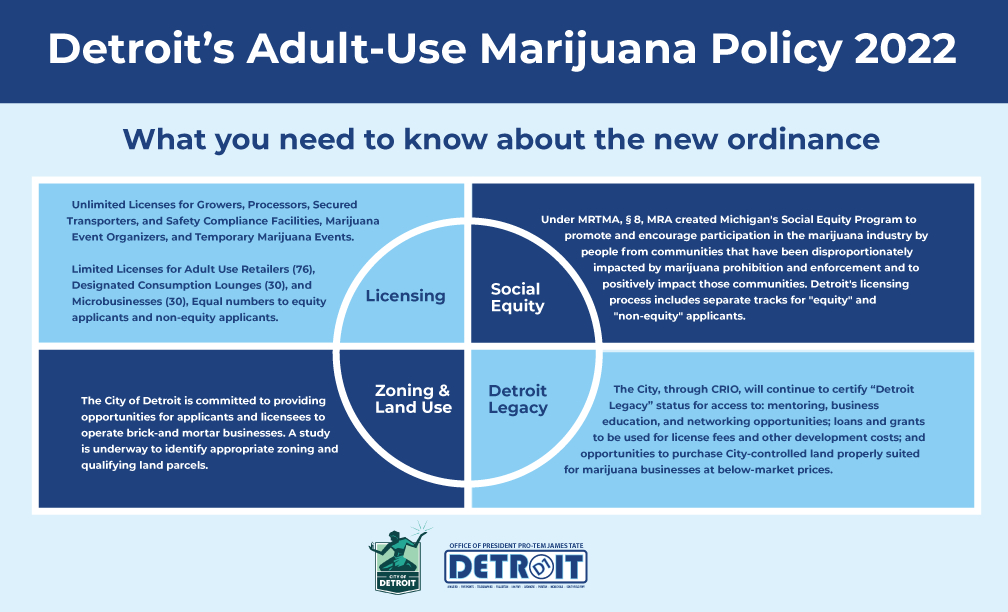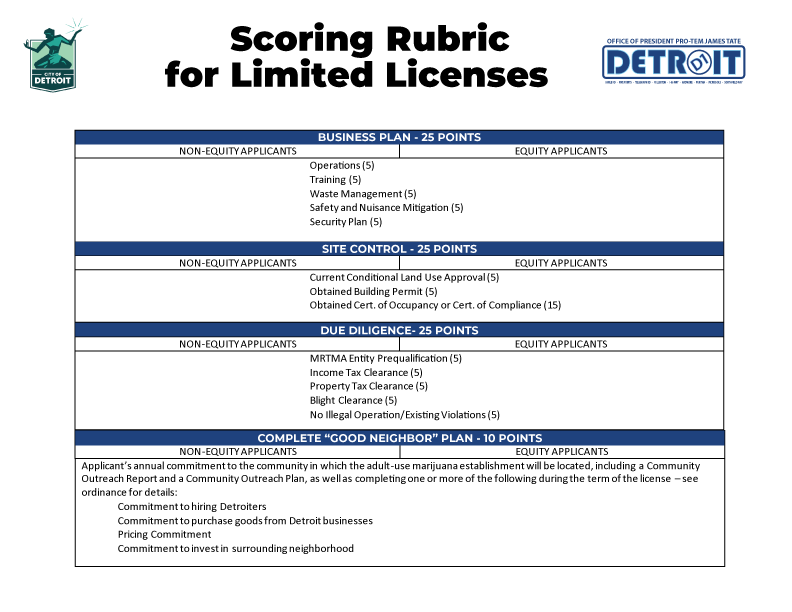The brand new framework creates two pipelines for potential hashish entrepreneurs — one for these utilizing Michigan’s social fairness program and one for everyone else.
Detroit Metropolis Council is rolling out new tips for licensing leisure marijuana shops, town’s second try at drafting an equity-based framework for hashish enterprise licensing. A federal choose blocked a earlier ordinance that pushed most licenses towards legacy Detroiters. The brand new laws modifications that and creates a brand new pathway primarily based on the Michigan Marijuana Regulatory Company’s definition of social fairness.
“We consider that it’s a a lot safer, far more potent argument legally if we focus solely on fairness candidates versus legacy Detroiters,” says Detroit Metropolis Council President Professional Tem James Tate, who authored the proposed ordinance.

Tate’s plan creates a scorecard to handle the restricted variety of permits for some marijuana-related companies. Detroit would have 76 licenses for dispensaries and 30 permits for each microbusinesses and designated consumption lounges. There are limitless licenses for growers, processors, transporters, security compliance services and short-term occasions. The town’s civil rights division will choose candidates primarily based on their enterprise plans and group outreach.
“We did that purposely as a result of we didn’t need fairness candidates to finish up having to compete for these licenses with people who’re extra well-funded and positively extra well-connected,” says Tate.
The brand new framework creates two pipelines for potential hashish entrepreneurs — one for these utilizing Michigan’s social fairness program and one for everyone else. The state Marijuana Regulatory Agency’s criteria includes past marijuana convictions and residency in areas with high poverty levels.
Tate says reframing the advantages round state requirements and including a scoring system improves the beleaguered laws.
“We had a chance to have a look at what we did the primary time round and we wished to make it higher,” Tate says.

In 2021, U.S. District Judge Bernard Friedman stopped previous legislation that prioritized longtime Detroit residents after it was challenged by someone who did qualify under the Detroit Legacy program. Friedman referred to as the ordinance “unfair” and “protectionist.”
“It is usually irrational to grant the choice to residents of Detroit however deny it to these of different communities, akin to neighboring River Rouge, when residents of each cities presumably suffered from the Battle on Medication to the identical extent,” Friedman wrote in his opinion.
The transfer thwarted elements of the Detroit Legacy program, which gave certain benefits to Detroit residents who had lived in the city for more than 10 years, with bonuses for low-income candidates and people who had earlier marijuana-related convictions. The town additionally put aside half of its enterprise permits for licensed Legacy Detroiters, giving different reductions on licensing charges and the buying of city-owned land.
Metropolis officers say the brand new ordinance would dispose of the licensing advantages for longtime residents. Nonetheless, the Detroit Legacy program will nonetheless present enterprise assist to those that have lived within the metropolis for greater than 10 years.
“We have now been capable of present programming, sources and technical help for over 800 potential hashish entrepreneurs,” says Detroit’s Director of Marijuana Ventures Megan Moslimani.
Tate’s plan has the backing of Mayor Mike Duggan.
“I’ve mentioned from the start that I’d not assist a leisure marijuana ordinance that will systematically exclude our residents and people who have been most negatively impacted by previous marijuana legal guidelines from taking part within the business,” Duggan wrote in a press release. “Councilmember Tate deserves an excessive amount of credit score for his work in creating a revised ordinance, which we consider meets the objective of guaranteeing equitable entry to this potential new business for all, together with Detroiters.”
The proposed ordinance was submitted to Metropolis Council’s Public Well being and Security Standing Committee. Officers are scheduling group outreach occasions because the laws strikes ahead. Metropolis Council President Mary Sheffield is endorsing the framework.
“It’s about creating generational wealth, possession, jobs for Detroiters, income for our metropolis,” Sheffield says.
Trusted, correct, up-to-date.
WDET strives to make our journalism accessible to everybody. As a public media establishment, we keep our journalistic integrity via unbiased assist from readers such as you. If you happen to worth WDET as your supply of reports, music and dialog, please make a gift today.















